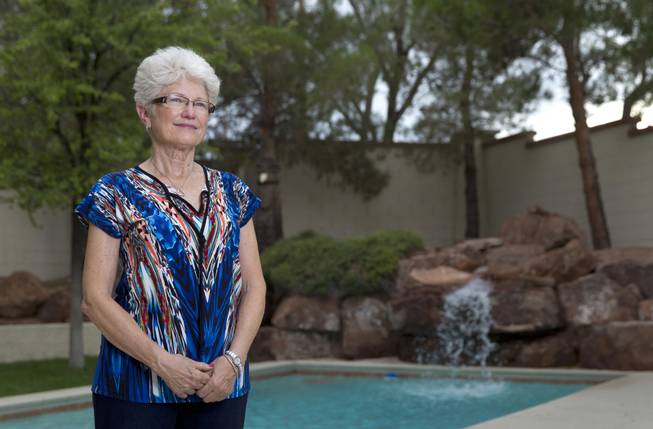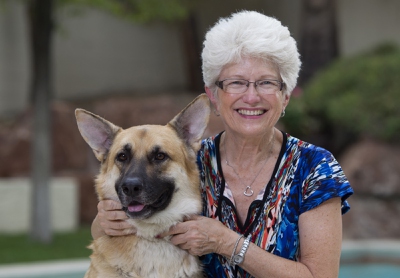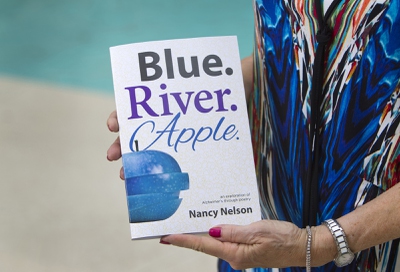
Nancy Nelson, 70, poses at her home in Summerlin on Tuesday, Aug. 12, 2014. After being diagnosed with early-onset Alzheimer’s disease last year, Nelson began waking up at 3 a.m. and would write poetry, she said. Her book of poetry titled “Blue. River. Apple.” was recently published.
Sunday, Sept. 7, 2014 | 2 a.m.

Nancy Nelson, 70, poses with Levi, a 2-year-old German shepherd, at her home in Summerlin on Tuesday, Aug. 12, 2014. After being diagnosed with early-onset Alzheimer's disease last year, Nelson began waking up at 3 a.m. and would write poetry, she said. Her book of poetry titled "Blue. River. Apple." was recently published.
To buy the book
Nancy Nelson’s book, “Blue. River. Apple.,” is available on Amazon or her website, www.blueriverapple.com.
Parked outside a doctor’s office, Nancy Nelson and her daughter sat frozen in their car.
They could skip the appointment and just go home without hearing the news. But three words haunted Nelson: blue, river, apple. Those were the words she failed to remember during the memory test.
“Are you sure you want to know?” Jennifer Drummond quizzed her mother.
“I want to know,” Nelson replied. “I’m good with it.”
So in they went. A short time later, a doctor entered the room and examined images of Nelson’s brain. It looked fairly normal for a 69-year-old woman, he said. Nelson and Drummond exchanged high-fives.
Then the doctor swiveled around.
“Based on your answers, you have early-onset Alzheimer’s.”
Their smiles melted to tears.
•••
Nelson learned to ride a bicycle at age 60 in order to compete in a triathlon. She prided herself on walking at least three miles a day and spent time after work in book clubs and writing groups. She regularly attended an Alzheimer’s caregivers’ group, trying to understand the disease that took her father’s life.
“She doesn’t do anything halfway,” said Drummond, 41.
But the insurance saleswoman was struck with insecurity after open-heart surgery in July 2012. She forgot clients’ names and what they had discussed a day earlier. She shrugged it off as being overwhelmed trying to get her life back on track after surgery. She waited for her memory to improve.
But it didn’t, and the nagging thought in the back of her head grew stronger: genetics. Her father died of Alzheimer’s, increasing her risk of developing the memory-robbing disease.
“When it became apparent to me that I needed to check this out, I did not want my children to feel the way I felt when I found out about my dad,” Nelson said. “I want them to be aware and have the time for all of us to heal and to walk through this challenge together, not to someday see me and not understand.”
Nelson, now 70, began trying to understand what was in store for her future.
She never considered herself a poet, but in the days and weeks that followed her diagnosis, she woke before sunrise, words tumbling from pen to paper. Soon, she had composed 60 poems chronicling mundane experiences such as misplacing her cellphone and visiting doctors, as well as poignant ones penned in love to her family. The poems were therapeutic, a diary of her emotions.
Gradually, she mustered the courage to share her poems with friends. Their positive, and sometimes teary-eyed, reactions got her thinking: Maybe her poetry could help others dealing with the disease.
In August, she published a collection of poetry called “Blue. River. Apple.” that she hopes gives strength to people suffering from Alzheimer’s and enlightens those caring for people with the disease.
The Alzheimer’s Association estimates that the number of Nevadans with Alzheimer’s will jump from 37,000 this year to 49,000 by 2020.
“There are a lot of people out there who need help, and whether they’re willing to out themselves or not, they could pick up this book,” Nelson said.
Almost a year since her diagnosis, Nelson has come to the conclusion that life is, in fact, better — and less stressful — knowing that she has Alzheimer’s. She retired in February and now spends hours writing in the home she shares with her daughter, son-in-law, two grandchildren and dog. Another daughter, Michelle, also lives in Las Vegas.
“I say I’m blessed to be aware,” Nelson said. “It is OK to say I forgot, I got mixed up, I didn’t mean to do that, oh dear.”
It also gives the former triathlete a new challenge, her most difficult to date.
“I don’t say I have Alzheimer’s,” Nelson said. “I say I have been diagnosed with Alzheimer’s. I’m not owning it. I’m going to beat it.”


Join the Discussion:
Check this out for a full explanation of our conversion to the LiveFyre commenting system and instructions on how to sign up for an account.
Full comments policy